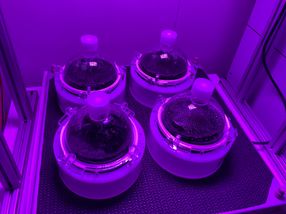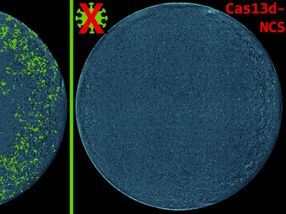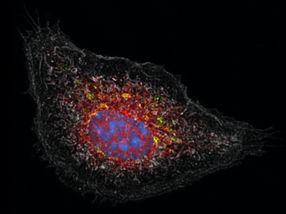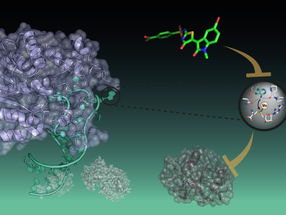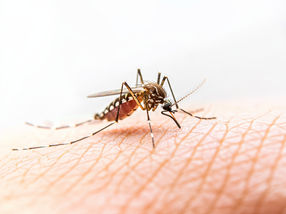Attacking tumors from the inside
A group of immune cells can infiltrate, deliver viral vectors and destroy tumor cells
The targeted delivery of drugs directly into cancer cells is becoming an increasingly common method of ensuring more accurate, safer cancer treatments. Scientists are now exploring the concept of using specially-created groups of immune cells to carry biologics – drugs derived from natural sources such as viruses - to target and kill cancerous tumors.

Researchers at Okayama University have demonstrated a novel method using HOZOT cells (immune cells derived from human umbilical cord blood, in green here) to carry biologics to cancerous tumors. The HOZOT cells infiltrate cancer cells whole before releasing their drug-load directly into the center of the cancer cell, killing it from the inside.
Okayama University
‘Cell-in-cell’ phenomena, wherein one cell infiltrates and occupies another cell, naturally occur in the human body. For example, the process whereby foreign, harmful substances are consumed by phagocytes, or when tumor cells invade immune cells, killing them in order to flourish themselves.
Now, Toshiyoshi Fujiwara and co-workers at Okayama University and scientists across Japan have utilized cell-in-cell behavior to their advantage, developing a tumor-targeting system using a novel human T-cell line called HOZOT that naturally targets and infiltrates human cancer cells. Their results could inspire many applications in the fight against different cancers.
HOZOT cell lines are established by co-cultivating human umbilical cord blood cells with mouse stromal cells. Crucially, the HOZOT cells are toxic only to cancer cells, and do not target normal healthy tissues. The HOZOT cells infiltrate tumor cells whole, and attack them from the inside. Fujiwara’s team hypothesized that these cells could be used as carriers for biologics. In this case, the researchers developed an adenovirus (OBP-401/F35) that would spread rapidly inside the tumor, killing it from the inside.
The virus-loaded HOZOT cells behaved in the same way as virus-free HOZOT lines, and so the team proceeded with trials against various human cancer cells, including colon cancer. The HOZOT carriers significantly reduced the viability of human cancer cells and suppressed the formation of tumor spheres. Additional trials on tumor-bearing mice showed increased survival rates in those treated by the HOZOT method. Also, the HOZOT carriers appear to prevent attack on the carried virus by the host’s immune system, which would recognize the virus if it was sent into the body without HOZOT cell protection.
As Fujiwara’s team state; “The unique cell-in-cell property of virus-loaded HOZOT cells provides a platform for selective delivery of biologics into human cancer cells, an outcome that has important implications for the treatment of human cancers.”
Original publication
Teppei Onishi, Hiroshi Tazawa, Yuuri Hashimoto, Makoto Takeuchi, Takeshi Otani, Shuji Nakamura, Fuminori Sakurai, Hiroyuki Mizuguchi, Hiroyuki Kishimoto, Yuzo Umeda, Yasuhiro Shirakawa, Yasuo Urata, Shunsuke Kagawa, and Toshiyoshi Fujiwara; "Tumor-specific delivery of biologics by a novel T-cell line HOZOT"; Scientific Reports; 2016
Most read news
Original publication
Teppei Onishi, Hiroshi Tazawa, Yuuri Hashimoto, Makoto Takeuchi, Takeshi Otani, Shuji Nakamura, Fuminori Sakurai, Hiroyuki Mizuguchi, Hiroyuki Kishimoto, Yuzo Umeda, Yasuhiro Shirakawa, Yasuo Urata, Shunsuke Kagawa, and Toshiyoshi Fujiwara; "Tumor-specific delivery of biologics by a novel T-cell line HOZOT"; Scientific Reports; 2016
Topics
Organizations
Other news from the department science

Get the life science industry in your inbox
From now on, don't miss a thing: Our newsletter for biotechnology, pharma and life sciences brings you up to date every Tuesday and Thursday. The latest industry news, product highlights and innovations - compact and easy to understand in your inbox. Researched by us so you don't have to.








